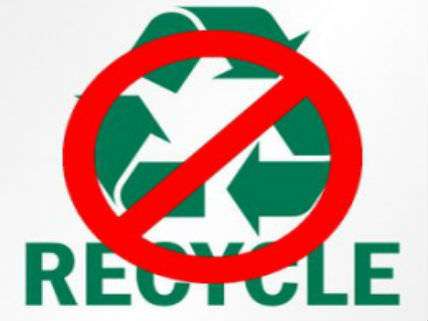Recycling Is Garbage Redux
Economic imbecility or religious ritual?

Nearly 20 years ago, New York Times journalist John Tierney investigated the economic and environmental effects of mandatory recycling in his article, "Recycling Is Garbage." His article basically concluded that mandatory recycling did not make much economic or environmental sense and legendarily provoked the most hate mail ever delivered to the Times. Now, nearly two decades later, the editors at the Times asked Tierney to revisit and re-report the topic which resulted in his new op-ed, "The Reign of Recycling," in this past Sunday's edition. So what did he find out this time?
From the article:
Despite decades of exhortations and mandates, it's still typically more expensive for municipalities to recycle household waste than to send it to a landfill. Prices for recyclable materials have plummeted because of lower oil prices and reduced demand for them overseas. The slump has forced some recycling companies to shut plants and cancel plans for new technologies. …
In New York City, the net cost of recycling a ton of trash is now $300 more than it would cost to bury the trash instead. That adds up to millions of extra dollars per year — about half the budget of the parks department — that New Yorkers are spending for the privilege of recycling. That money could buy far more valuable benefits, including more significant reductions in greenhouse emissions.
Tierney probes why such a large segment of the public and so many politicians want to impose recycling requirements. For example, New York City Mayor Bill de Blasio has declared "zero-waste" as a goal for the city to achieve by 2030. Tierney argues that such goals have become for some people a form of repentance for the "sinful" enjoyment of material affluence:
Religious rituals don't need any practical justification for the believers who perform them voluntarily. But many recyclers want more than just the freedom to practice their religion. They want to make these rituals mandatory for everyone else, too, with stiff fines for sinners who don't sort properly. Seattle has become so aggressive that the city is being sued by residents who maintain that the inspectors rooting through their trash are violating their constitutional right to privacy.
It would take legions of garbage police to enforce a zero-waste society, but true believers insist that's the future. When Mayor de Blasio promised to eliminate garbage in New York, he said it was "ludicrous" and "outdated" to keep sending garbage to landfills. Recycling, he declared, was the only way for New York to become "a truly sustainable city."
But cities have been burying garbage for thousands of years, and it's still the easiest and cheapest solution for trash. The recycling movement is floundering, and its survival depends on continual subsidies, sermons and policing. How can you build a sustainable city with a strategy that can't even sustain itself?
That's a really good question. The whole article is well worth your attention.
For more background, see my colleague Katherine Mangu-Ward's excellent article, "Plastic Bags Are Good For You."
Disclosure: Tierney introduced me and moderated a discussion about my new book, The End of Doom: Environmental Renewal in the Twenty-First Century, at a book party in New York City last week.


Show Comments (305)